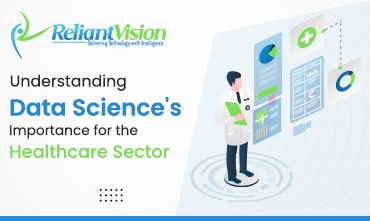Each human body produces 2 gigabytes of data each day, claims one research. This data consists of a variety of things, such as heart rate, sugar levels, stress levels, and brain activity. We now have more sophisticated technology, including data science, to handle and preserve such enormous volumes of data. Using collected data assists in monitoring patients’ health.
The use of data science in medicine has allowed for the early diagnosis of a variety of diseases. Thanks to the evolution of innovative resources and technology, doctors may now check up on their patients remotely as well.
Before, medical staff and hospital management were unable to care for many patients at once. And as a result of inadequate care, the patient’s problems became worse.
The situation has altered as a result of data science applications in healthcare. Wearable health monitoring devices can provide alerts to clinicians with the use of data science and Machine Learning software. Junior medical professionals, helpers, and nurses might be sent to these patients’ homes by the hospital administration.
For these patients, hospitals may also set up a variety of diagnostic tools and equipment. These technology-based instruments may gather patient data like temperature, blood pressure, and other physiological measurements. Mobile application updates and alerts provide clinicians access to real-time patient health information. They may then make a diagnosis and assist more junior medical professionals or nurses in providing patients with certain therapies at home. This is an example of how data science can use technology to improve medical care.
Data science’s advantages for the healthcare sector
Data science is now a crucial element and a driving force that has transformed the healthcare sector. Improvements in infrastructure and operations have resulted from the use of data science and other forms of technical expertise. Treatment and diagnostic times have decreased as a result. This enhances the healthcare device’s efficiency. The use of data science in medicine has the following advantages:
- It supports effective response to emergency circumstances.
- Patients’ treatment times are shortened as a result.
- It offers timely and suitable therapy.
- The process in the healthcare industry is made more effective.
- It helps to reduce the possibility of failure while treating any afflicted person.
Data science applications in the healthcare sector
Numerous uses of data science are changing how healthcare providers function, academics carry out research, and patients get treatment. The following are some essential uses of data science in healthcare:
- Predictive Analytics: To find trends and forecast results, data science methods may be used to analyze vast amounts of healthcare data, including patient records, demographics, and medical histories. This aids in forecasting disease development, identifying people at high risk, and recommending customized treatment regimens.
- Early Detection and Accurate Diagnosis of Diseases: Algorithms based on data science may help with both. Data-driven models may help medical personnel make more educated diagnoses and prognoses by assessing patient symptoms, medical pictures, and laboratory findings.
- Data science allows the creation of individualized treatment regimens for patients based on traits including their genetic make-up, medical history, way of life, and environmental effects. This strategy may increase the effectiveness of the therapy while reducing side effects.
- The process of discovering and developing new medicines makes use of data science methods. Potential drug candidates may be identified and their effectiveness predicted by applying machine learning algorithms to massive volumes of data, such as molecular structures, genetic data, and clinical trial outcomes.
- Wearable gadgets like fitness trackers, smartwatches, and remote patient monitoring systems all rely heavily on data science to keep tabs on their users’ health and wellness stats. These gadgets monitor and analyze vital signs, sleep habits, and activity levels, among other health indicators, in real-time, so that anomalies may be spotted sooner rather than later.
- Electronic Health Records (EHRs) and Clinical Decision Assist: To manage and analyze EHRs, discover patterns, and assist clinical decision-making, data science approaches may be applied. This involves creating clinical decision support systems that provide recommendations for treatments based on the best available research.
- Public Health Surveillance: By examining large datasets, such as disease surveillance data, environmental data, and social media data, data science aids in the monitoring of public health. It makes it possible to monitor the transmission of infectious illnesses, diagnose disease outbreaks early, and execute successful public health measures.
- Healthcare Operations and Resource Optimization: By examining data on patient flow, resource use, and wait times, data science approaches may enhance healthcare operations. This data aids in resource allocation, scheduling, and personnel optimization, eventually enhancing patient care and lowering expenses.
Final words
There is ample evidence that data science applications in healthcare are presently beneficial to society and will be considerably more so in the future. It will be a boon to the healthcare sector. The doctors will be supported, and the patients will get exceptional care.
Long-term goals of self-management enhanced patient care, and more effective therapy may be realized with the use of big data. Data science’s real-time predictive analytics may help doctors better understand their patients and their diseases so they can give more personalized treatment. Science, epidemiological research, tailored medicine, and other fields will all benefit.

